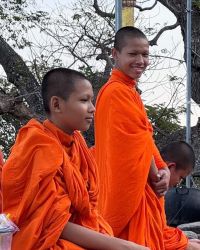Khmer, Cambodian in United States

Photo Source:
Anonymous
|
Send Joshua Project a map of this people group.
|
| People Name: | Khmer, Cambodian |
| Country: | United States |
| 10/40 Window: | No |
| Population: | 267,000 |
| World Population: | 17,598,700 |
| Primary Language: | Khmer |
| Primary Religion: | Buddhism |
| Christian Adherents: | 3.00 % |
| Evangelicals: | 1.60 % |
| Scripture: | Complete Bible |
| Ministry Resources: | Yes |
| Jesus Film: | Yes |
| Audio Recordings: | Yes |
| People Cluster: | Mon-Khmer |
| Affinity Bloc: | Southeast Asian Peoples |
| Progress Level: |
|
Introduction / History
The Cambodian Diaspora is made up of those who left Cambodia starting in April 1975, when the government fell to the Khmer Rouge. Khmer began to flee the Killing Fields to find safety in refugee camps along the Thai border. This continued through the 1980s as the Vietnamese army invaded and occupied Cambodia. These displaced people sought acceptance as refugees in various countries. The United States, Australia, France, Canada and other countries became the new home for Khmer refugees.
Khmer refugees poured into the United States in the late 70s and 80s. The suffering they experienced under the Khmer Rouge caused many to experience post-traumatic stress disorder. Also, most Cambodian refugees had a low level of education; their only way of making a living was through rudimentary agriculture. In Canada they were usually settled in urban areas where they could not use their agricultural experience.
Second generation Cambodians, often dropped out of high school and few attended college; therefore, their economic problems are passed on from one generation to the next. Some have joined gangs which exacerbates their problems.
What Are Their Lives Like?
The Khmer community in the United States is now in the third generation. They are struggling to maintain their culture, one that seems increasingly distant for the well-acculturated younger generation. The Buddhist temple often fills this need along with cultural associations where they celebrate Cambodian festivals and keep their music and cuisine alive in the new land.
Cambodian women are known for their nail salons which give them contact with women from many ethnic groups. This generation is slowly getting better education so they can have more economic stability. Some Cambodians have contributed to America as athletes, musicians and politicians.
What Are Their Beliefs?
Khmer in the West have similar beliefs to those in Cambodia. They practice Theravada Buddhism mixed with animism and ancestor worship. When Cambodians arrived in the Thai refugee camps, many heard the gospel and a high percentage made professions of faith. This trend continued as they were sponsored by Christian churches in the West. Unfortunately, as they settled into their host countries many fell away. Over time, Buddhist temples were built in those countries which provide a place to practice their Khmer culture and traditional beliefs.
At the same time, Cambodian churches have had a significant influence. In the early 1990s, there were more Khmer believers in the West than in Cambodia. When a new Cambodian government was formed, many of these Christians played an important role in bringing the Gospel back to their homeland. Today, the overseas churches continue to send money and people to support the growing Christian movement in Cambodia.
What Are Their Needs?
Cambodians in the West need to adapt to their new countries. The second and third generations need better educational opportunities so that their communities can emerge from the poverty which has characterized their overseas experience. As it stands, the Khmer are far less economically prosperous than other Southeast Asian peoples.
Spiritually, few have given Jesus Christ a chance to bless their lives. Decades after their arrival the Khmer remain Buddhist.
Prayer Points
Pray for the spiritual hunger it will take for Cambodians in the US to seek and find the only savior.
Pray for Christians to reach out to the Cambodians until they know why Jesus died and rose again.
Pray for Cambodians who will disciple others to take Christ to others.